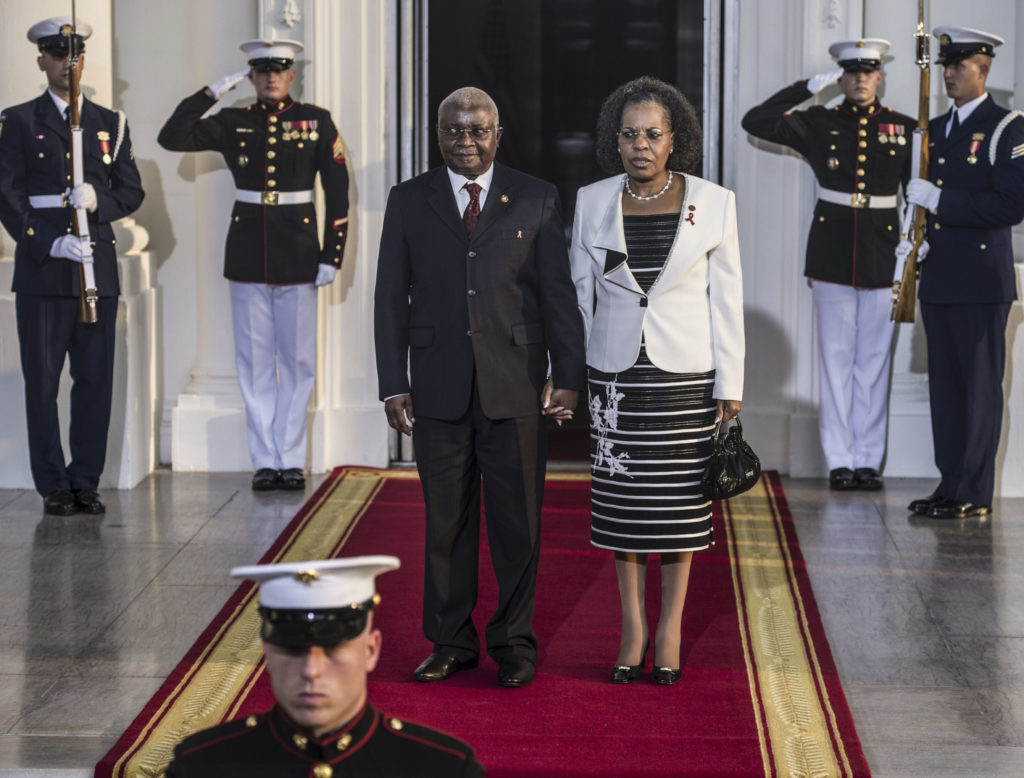President Armando Guebuza arrives at the White House for a group dinner during the US Africa Leaders Summit August 5, 2014 in Washington, DC. (BRENDAN SMIALOWSKI/AFP/Getty Images)
COMMENT
Set against the backdrop of Franschhoek’s breathtaking mountain range, the historic La Terra De Luc wine estate was revealed in the Panama Papers to be owned by the family of Vito Palazzolo, a notorious financier alleged to have worked for the Italian mafia.
Like Palazzolo, a host of Africa’s former political leaders and their families are also stashing their cash in South Africa’s property market. The country’s status as Africa’s most sophisticated financial hub, and its low prosecution rate, are enabling politically exposed persons to hide vast amounts of money in real estate.
Zoé Kabila, the brother of the Democratic Republic of Congo’s former president, Joseph Kabila, bought two properties in Sandton and Bryanston for R9-million, less than a year before Kabila stepped down as president.
The children of Mozambique’s former president Armando Guebuza bought properties in Dainfern in nothern Johannesburg and Kyalami Estate worth a combined R50-million. The properties were purchased at the same time that bribes were received by Guebuza’s government, according to United States court documents.
There are several mechanisms, including large cash purchases, the use of third parties (such as offshore and shell companies), and buying or selling properties for significantly different values than market prices, that could enable people to profit from South Africa’s real estate market. Artificial leases could also allow illicit funds to be laundered.
Investing illegal money in properties, whether residential or commercial, conceals the origin of funds and acts as an entry-point into legal markets. If the properties are sold, leased or transferred, particularly if they are owned by companies rather than individuals, such profits are “legalised”.
Money laundering using property as a vehicle artificially inflates house prices. That makes some areas too expensive for South Africans to buy houses. It also skews market values and takes away citizen space and affordable housing initiatives in favour of projects that benefit high net-worth individuals.
 Former Mozambique president Armando Guebuza (Brendan Smialowski/AFP)
Former Mozambique president Armando Guebuza (Brendan Smialowski/AFP)
No questions asked
South African real estate companies are part of the problem.
Pam Golding, a leading Cape Town-based estate agency with 300 branches across the African continent as well as in the US, appears to have been fully aware of South Africa’s regulations, which require real estate companies to identify the origin of funds used to purchase properties and carry out enhanced due diligence on politically exposed persons.
But Pam Golding allegedly received illegal funds in their trust account on behalf of then-president Guebuza’s son, according to the US court transcripts.
The funds were sent through Privinvest, a Lebanon-based shipbuilding company that was identified by US public prosecutors as part of a probe into Mozambique’s $2-billion bond that is alleged to have indebted Mozambicans and defrauded investors, the transcripts show. Privinvest served as a primary conduit for the payment of bribes to high-level Mozambican officials including the former finance minister, Manuel Chang, prosecutors said in the court documents.
But, unlike more sophisticated attempts, the properties owned by Guebuza’s children —Armando Guebuza and Valentina Guebuza — were listed under their own names on the title deeds.
Pam Golding should certainly have known that the vast sum of the Guebuza children’s property sale, and the use of a third party, warranted an investigation.
Through a law firm, Pam Golding declined to respond to requests for comment but confirmed the matter was under investigation.
According to an email seen by the authors, the real estate firm kept a close watch over any changes to South Africa’s Financial Intelligence Centre Act, which is mandated to identify the proceeds of crime, combat money laundering and terrorism financing.
But that didn’t stop them from taking the Guebuza family’s money.
Regulators sound the alarm
South Africa’s property market was described in 2005 as one of the most profitable in the world. But a slowdown in 2008, which eluded specific geographic pockets, triggered an examination of illicit funds in the sector. In response, several government institutions have spoken about the need to limit illicit financial flows, including those hidden in the country’s real estate market.
The late Kader Asmal, the former president of the Financial Action Task Force (FATF), which was formed in 1989 with a mandate to combat money laundering and terrorism, said money laundering had boosted the value of South Africa’s property market as the former apartheid regime allowed for individuals to splash cash and organised crime groups expanded across the country.
South Africa’s Finance Intelligence Centre (FIC) said the country’s “property environment, including renovation and improvements, is often associated with criminal proceeds related to corruption and narcotics as well as a variety of other predicate offences”.
Cleaning up the sector
South Africa’s government needs to clean up the property sector.
It should ensure that property sales involving cash transactions are closely monitored.
It should also redouble efforts to publicly name beneficial owners when properties have been bought or sold through companies.
Offshore accounts, companies and intermediaries should be subjected to enhanced due diligence by financial institutions and real estate firms.
When politically exposed persons are involved in the sale of a property, suspicious reports should be filed by agencies where income is far exceeded by property value.
Private sales must be closely scrutinised, particularly when properties are sold or bought at prices contrary to their market value.
Massive commissions allow estate agencies to turn their gaze in a different direction, giving rise to the possibility of becoming partners in crime. If the law prohibited real estate companies from accepting money from tax havens or third parties, African kleptocrats wouldn’t be able to stash their ill-gotten gains in South Africa.
Khadija Sharife and Mark Anderson are Africa editors at the Organized Crime and Corruption Reporting Project. The views of the authors do not necessarily represent those of the organisation